Real Estate newsletter: A big week for ‘Flintstones’ housing
Welcome back to the Real Estate newsletter, which arrives on the heels of a big week for fans of Fred Flintstone, Barney Rubble and the gang. Somehow there were two “Flintstones”-related housing stories this week — an event too rare not to give the top spot, even during a stretch that saw the second-biggest home sale this year.
Up in the Northern California town of Hillsborough, a woman has won a fight against the locals who filed a lawsuit calling her “Flintstones” home with 15-foot dinosaur statues a “highly visible eyesore.” The bizarre residence and its caveman decor will stand, and a court ordered the town to pay the homeowner $125,000 to cover legal fees.
On the other end of the state in Escondido, a whimsical cave-like home that looks like a cross between a “Flintstones” abode and a Hobbit house from “The Lord of the Rings” traded hands for $1.145 million after seven years on and off the market.
L.A. County saw a pair of high-profile homes sold by a pair of high-profile sellers. “Avengers” director Anthony Russo unloaded the famed Cordelia A. Culbertson House in Pasadena — a 110-year-old estate built by star architectural firm Greene & Greene — for $6.25 million.
And on the coast of Malibu, a futuristic beach house owned by late billionaire Eli Broad sold for $51.65 million, making it Southern California’s second-priciest home sale this year.
The end of June marked the halfway point of 2021, so we rounded up the biggest deals this year. Hotel magnates, media moguls and talk show hosts fill out the star-studded list.
Some big news came down from Sacramento as well: Gov. Gavin Newsom signed a bill protecting California tenants from eviction for an additional three months, extending protections that were set to expire at the end of June.
While catching up on the latest, visit and like our Facebook page, where you can find real estate stories and updates throughout the week.
‘Flintstones’ dinos will stay
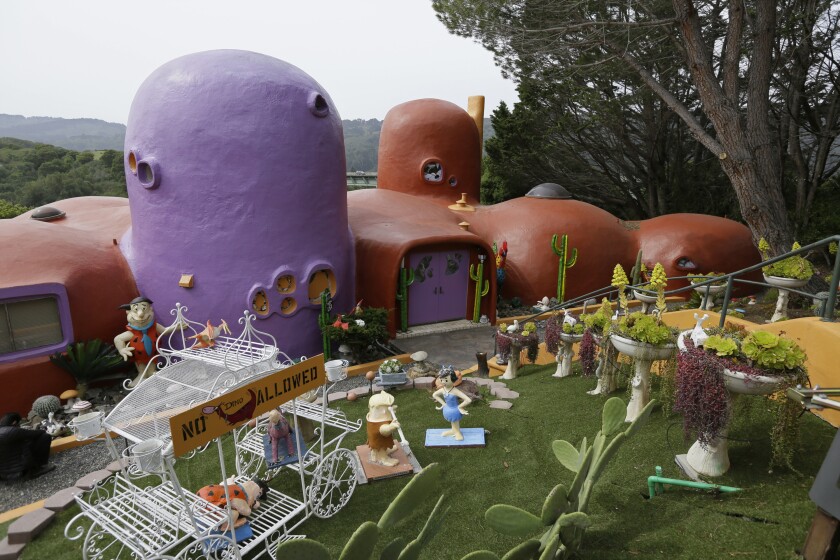
The Flintstone House is seen before a news conference with the owner and the home’s original architect in Hillsborough, Calif.
(ASSOCIATED PRESS)
Following a lengthy court battle, the Northern California owner of the “Flintstone House” has quietly settled her lawsuit against the town of Hillsborough, Melissa Hernandez reports.
Florence Fang, the home’s owner, will receive $125,000 from the town to cover legal costs from her lawsuit, according to the settlement agreement. Fang must also apply for building permits for the exterior of her home, which will be approved by the town once submitted, according to town records.
Fang’s lawsuit began in March 2019, after the town of Hillsborough deemed the home’s lawn decorations as a “highly visible eyesore” following complaints from neighbors and residents. Town officials alleged that the caveman-themed menagerie of 15-foot dinosaur statues and cartoon sculptures violated building codes and were built without proper permits.
Fang, former publisher of the San Francisco Examiner, was sent multiple notices. After she failed to comply with stop-work orders, as well as an order to remove the collection of metal dinosaurs and animals from her backyard, the town took her to court in San Mateo County.
Cave-like home trades hands
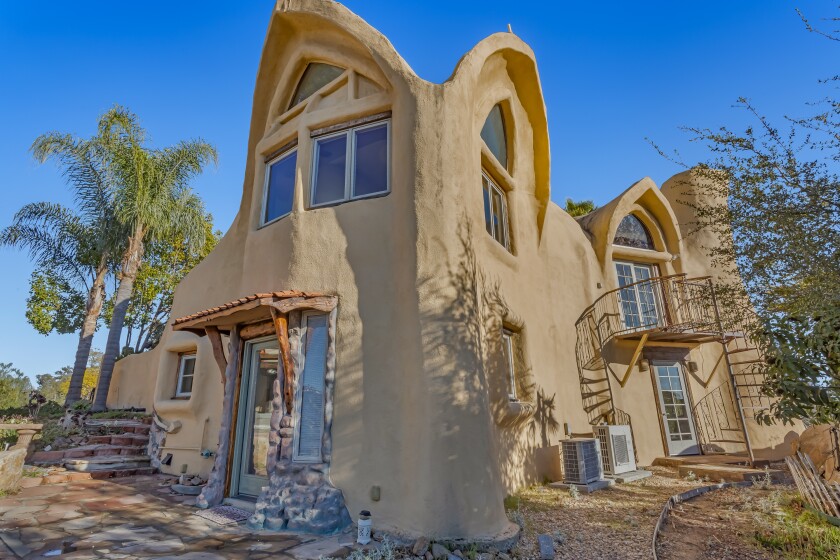
A cave-like home built to blend in with the craggy, rock-laden hills that surround it.
(David Lamb)
In the craggy, rock-laden landscape outside Escondido, one residence sticks out from the rest. The whimsical, cave-like home — built in harmony with the rugged terrain that surrounds it — just sold for $1.145 million after spending seven years on and off the market.
The striking desert estate was designed by James Hubbell, a San Diego artist whose eccentric creations have been likened to Hobbit houses from “The Lord of the Rings” books and films.
It looks like a fitting home for Frodo or even Fred Flintstone, but for the last two decades it belonged to artist Gale Pruitt, who periodically offered tours of the one-of-a-kind retreat and most recently listed it for $1.195 million in March.
Standard wood framing is nowhere to be seen. Instead, the house consists of 13 Persian arches made of steel pipes and more than a mile of rebar and galvanized wire mesh. Hubbell then encased the roof in four inches of concrete and four inches of roof foam, coated it in liquid rubber and painted the exterior to match the tan boulders that dot the 15-acre grounds.
Marvel director sheds Pasadena landmark
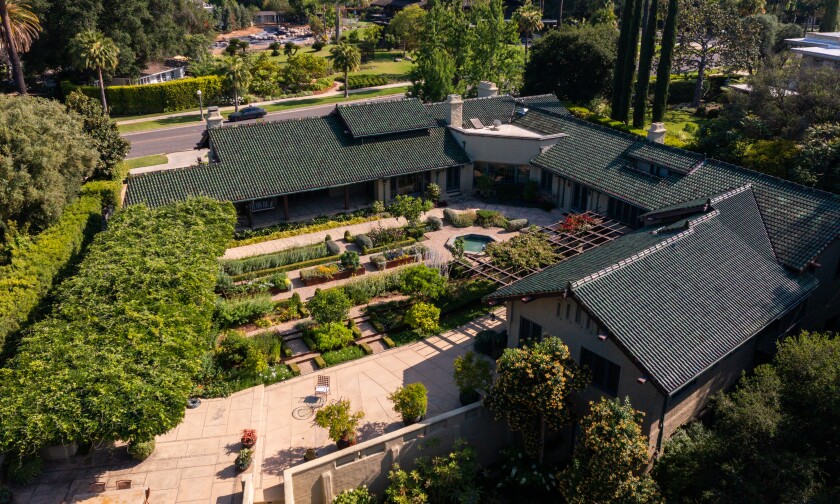
Aerial view of a large house with landscaping
(Alex Zarour / Virtually Here Studios)
An architectural landmark traded hands in Pasadena, where Marvel director Anthony Russo sold the famed Cordelia A. Culbertson House for $6.25 million — or $250,000 more than he was asking.
Russo, who’s directed four films in the Marvel Cinematic Universe with his brother Joe, owned the one-of-a-kind home for three years. Records show he bought it for $5.8 million in 2018 a few months before the release of his film “Avengers: Endgame,” which became one of the highest-grossing films of all time.
He’ll still be close by in Pasadena. In 2019, he dropped $15.579 million on the Arden Villa, a Palladian-inspired Italianate mansion with a star-studded past of celebrity owners and appearances in the films “Terms of Endearment” and “Billy Madison.”
His new digs are a bit bigger at 10,000 square feet on 2.4 acres, but the Culbertson House boasts an illustrious history of its own. It was built 110 years ago by Greene & Greene, the brother architect duo more famous for the Gamble House, a Craftsman masterpiece and Pasadena landmark that sits about three miles away.
The second-highest sale of the year
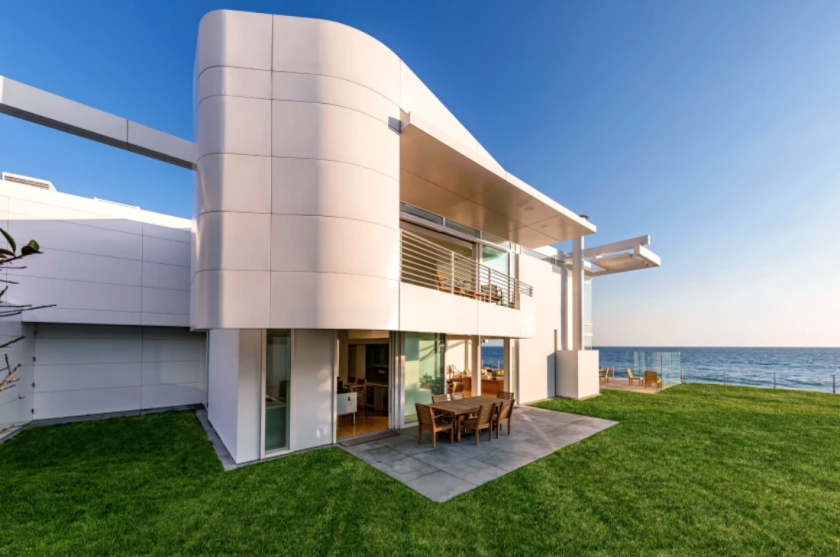
The Malibu beach house of billionaire philanthropist Eli Broad was designed by Richard Meier, the architect who designed the Getty Center.
(Berlyn Photography)
Two months after Eli Broad’s death, his Malibu home has sold for $51.65 million. It’s the second-priciest sale to close in Southern California this year.
The billionaire, who who made his fortune building homes and then poured his wealth back into Los Angeles, bought the two-parcel property in the late 1990s and commissioned architect Richard Meier to build the home shortly after. Meier finished the place in 2002, and the futuristic design recalls some of his other famous works including the Getty Center and the Barcelona Museum of Contemporary Art.
Broad’s house sits on Carbon Beach, a prized stretch of sand that’s been nicknamed Billionaires Beach for good reason. Houses in the community regularly list for north of $20 million, and in 2018, hotelier Peter Morton sold his oceanfront compound there for a then-record $110 million.
Wrapped in white aluminum panels and frosted glass, the modern residence looks nothing like the humbler homes that surround it. Sleek and curvaceous, it features light-filled living spaces, such as a two-story great room and indoor-outdoor owner’s suite with a sauna.
Top sales of 2021 (so far)
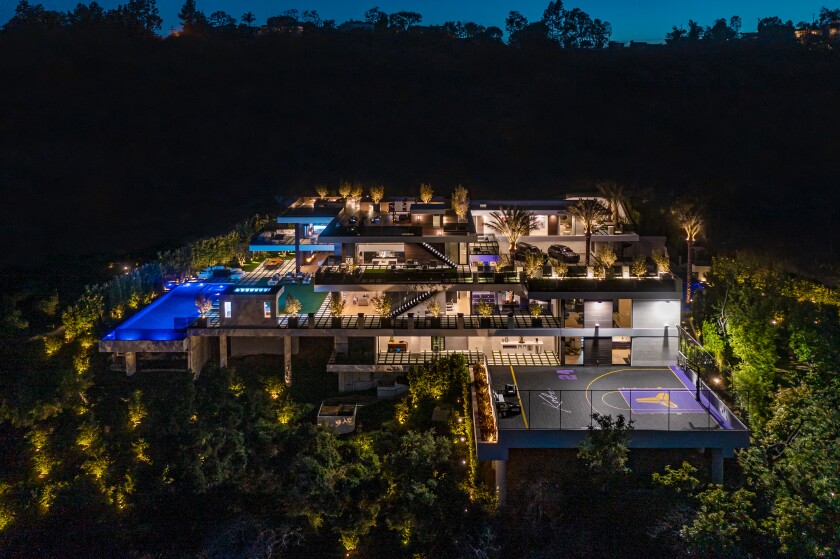
This amenity-loaded Brentwood mansion includes two pools, a cannabis garden and Kobe Bryant-themed basketball court.
(Simon Berlyn and Drone Hub Media)
Southern California’s real estate market has been historically hot this year. Whether it’s a 700-square-foot bungalow or 10,000-square-foot mansion, a shortage of housing stock has caused bidding wars in every corner of the market.
The first six months of 2021 saw the ultra-rich buying and selling luxury homes at a brisk pace across the region with celebrities, media moguls and business magnates all getting in on the action. Nine estates closed for north of $30 million, which is one more compared with the same stretch last year. Here are the top sales this year.
Newsom extends rent protections

Ian Jameson (left) of El Monte organized a gathering of tenant rights activists at El Monte City Hall in March 2020 to demand that the El Monte City Council pass an eviction moratorium barring all evictions during the coronavirus pandemic.
(Jason Armond/Jason Armond/Los Angeles Times)
California tenants will be protected from evictions for another three months, and those with low incomes will have all of their past-due rent paid by the state, under a bill signed June 28 by Gov. Gavin Newsom in response to the COVID-19 pandemic, writes Patrick McGreevy.
The governor acted just hours after both houses of the Legislature approved the bill extending the eviction protections through Sept. 30. Lawmakers cited urgency stemming from the expiration of previous protections that was set for June 30.
“California will significantly increase cash assistance to low-income tenants and small landlords under the state’s $5.2 billion rent relief program, making it the largest and most comprehensive COVID rental protection and rent relief program of any state in the nation,” said a statement by Newsom’s office.
The action doubles the funding of the rent relief program, allowing payment of 100% of low-income tenants’ past-due rent back to April 2020 and until the expiration of the eviction protections, as money is available.
What we’re reading
The historic housing shortage is finally showing signs of letting up. Citing Realtor.com data, CNBC reports that new listings in June increased 5.5% year-over-year and 10.9% compared to May — a welcome sight for potential homebuyers who’ve lost bidding wars over the past few months.
Each year brings a wave of new gadgets to cram into your house, but Gizmodo makes a case against the automated smart house. Turn-offs such as complicated installation and technology that quickly becomes obsolete make some homeowners appreciate living the old-fashioned way.
